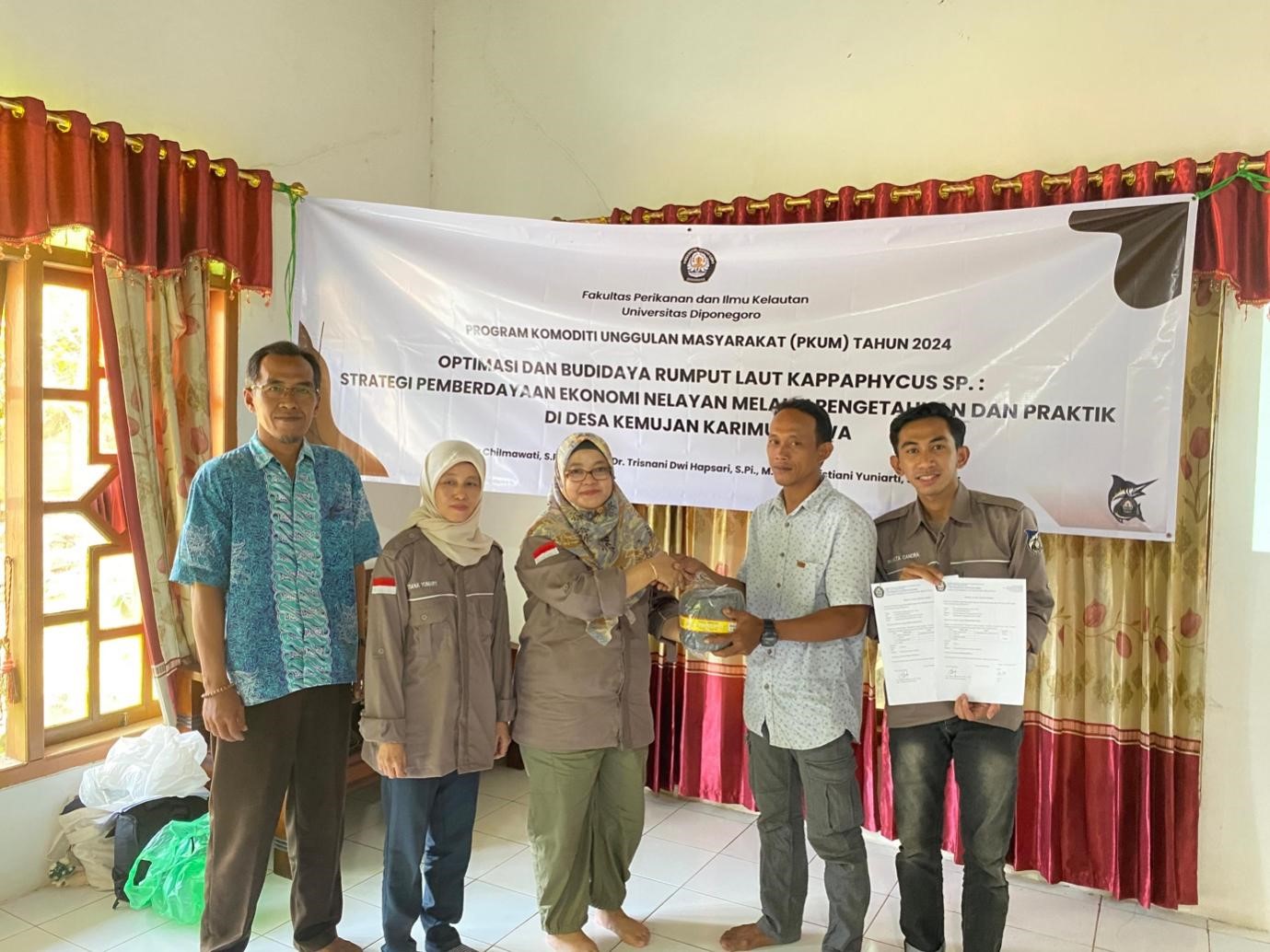UNDIP – The community service program of Universitas Diponegoro involved students from the Thematic Community Service Program (KKN-T) from three faculties: the Faculty of Fisheries and Marine Science (FPIK), the Faculty of Science and Mathematics (FSM), and the Faculty of Economics and Business (FEB), contributing to a work program titled “Strengthening Community Leading Commodities (PKUM) 2024,” focusing on Kappaphycus sp. cultivation in Kemujan Village, Karimunjawa.
This commodity was chosen for its high potential as a low-cost venture with increasing market demand. Kappaphycus sp. requires simple and inexpensive production technology and has a short production cycle, making it an ideal choice for coastal communities. Additionally, its post-harvest handling is easy, while its market share remains open.
The UNDIP lecturer team involved in the community service included Dr. Diana Chilmawati, S.Pi., M.Si. (Dept. of Aquaculture); Tristiana Yuniarti, S.Pi., M.Si. (Dept. of Aquaculture); Dr. Trisnani Dwi Hapsari, S.Pi., M.Si. (Dept. of Capture Fisheries); and Pranata Candra Perdana Putra, S.Pi., who provided material and guidance to the Jaya Karya Mandiri group and Zulfikar, the leading partner, during the activity held on October 24, 2024, at the Balai Sekretariat Mitra.
The activities began with a workshop on how to address ‘ice-ice’ disease and more effective digital marketing strategies. On Friday, October 25, 2024, the program continued with selecting the optimal cultivation site for Kappaphycus sp. growth and an online marketing demonstration accessible through the website https://rumputlautkarimunjawa.web.id.
The program was enthusiastically received by participants who saw new opportunities to address production and marketing challenges through various methods introduced.
Diana Chilmawati expressed that this program is expected to be a concrete solution for the fishermen in Kemujan Village. “With this training, we aim to equip the fishermen with modern marketing skills and strategies that not only enhance productivity but also expand their market network,” said Diana.
Zulfikar, head of the Jaya Karya Mandiri group, also expressed hope that this assistance would bring sustainable positive change. One of the KKN-T students mentioned that the activity opened their understanding of the importance of collaboration between universities and communities to advance the village economy.
The PKUM program aims to empower the community through integrated coaching to improve the productivity of cultivation in terms of both quality and quantity. This empowerment is designed to provide sustainable impacts, not only through enhancing the technical skills of cultivators but also by providing insights into optimal and environmentally friendly cultivation management.
Field identification results showed that cultivators in Kemujan Hamlet face five significant challenges hindering seaweed cultivation productivity. One serious threat is the attack of gotho moss pests or the ‘ice-ice’ disease, which disrupts the growth of seaweed in Kemujan Island, Karimunjawa.
Poor water quality conditions, mainly due to minimal ocean currents, worsen the situation—stagnant seawater results in decreased water quality, which directly impacts production outcomes. Consequently, seaweed cultivation productivity has seen a significant decline year after year, posing a major challenge for cultivation groups like Jaya Karya Mandiri.
Through the “Strengthening Community Leading Commodities 2024” program, it is hoped that cultivators in Kemujan Village can optimize the cultivation of Kappaphycus sp. and achieve better economic benefits in the future. (PKUM Team Kemujan Village 2024; Ed. DHW)
